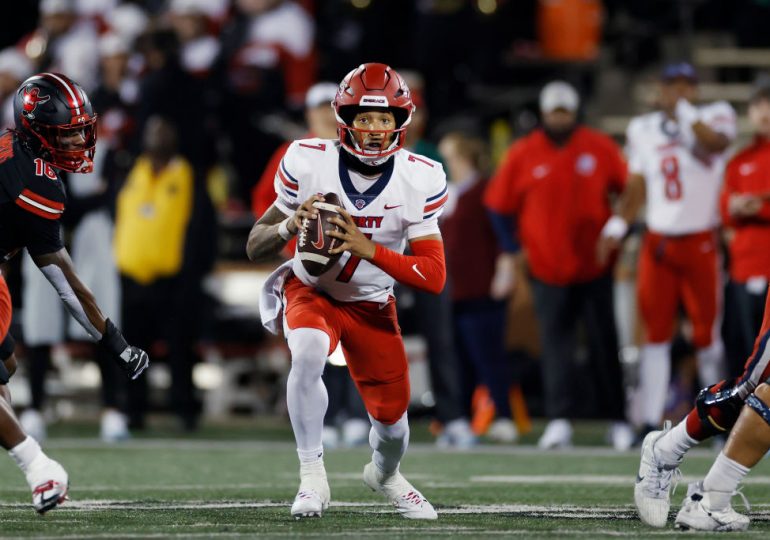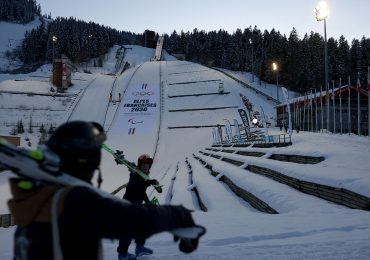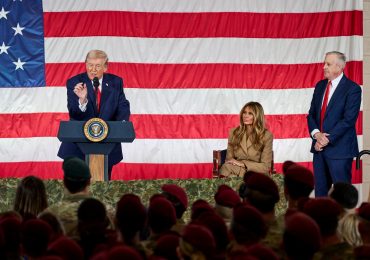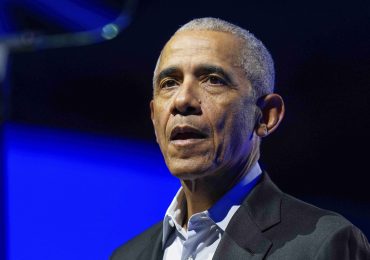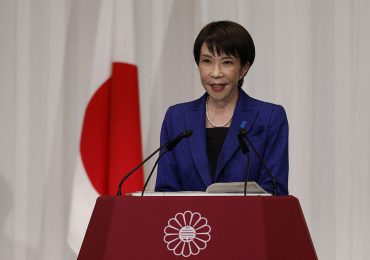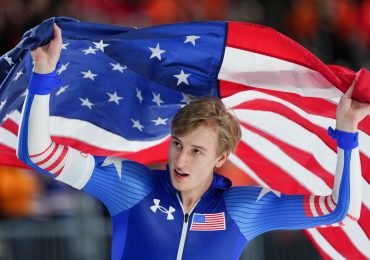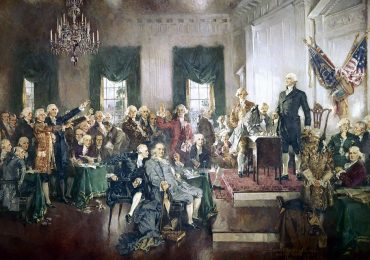On Jan. 1, 2024, Liberty University faces off with the University of Oregon in the Fiesta Bowl.
As millions of Americans tune into the football game, they will be watching the fulfillment of Liberty founder and chancellor Jerry Falwell’s greatest prophecy. Athletic success formed a foundational part of Falwell’s plan for the school, so much so that its founding mission statement promised “Here we Train Champions for Christ.”
[time-brightcove not-tgx=”true”]
From the beginning, Falwell declared it a goal for Liberty to be the evangelical equivalent of Notre Dame for Catholics and Brigham Young University for Latter-day Saints, both football powerhouses. Falwell’s vision has had major implications for the country. He infused students with a new, strident, aggressive form of faith that has reshaped American religion and politics over the last half century. In real ways, Liberty has driven the growth of the Christian Nationalism that is at the forefront of American politics today — and it has often used its football team to do so.
Founded in 1971, Liberty did not field a football team for its first two academic years. In 1973, however, Liberty added football and Falwell immediately began using it as a tool to preach his message that the U.S. had to return to what he argued were its Christian roots.
The football media guide for 1975 signified his vision for the school. The cover displayed three American flags, the word “FLAMES” in star-spangled-banner font, and a bald eagle with arrows in its right talon, an olive branch in its left, and a football in its beak. The media guide praised Falwell as a conqueror. It also interspersed cartoons that illustrated the school’s emphasis on patriotism, America’s founding, and faith with information about the team.
From 1975 to 1988, Falwell stressed the spiritual qualifications of Liberty’s football coaches, but they lost more games than they won. Their record and lower level of competition limited the team’s visibility and Falwell’s platform.
Read More: Theologian Russell Moore Has a Message for Christians Who Still Worship Donald Trump
In 1988, Falwell decided it was time to hire a coach who would bring more attention and wins to his burgeoning football program. He settled on former Cleveland Browns coach and ESPN announcer Sam Rutigliano. In a Sporting News article, Falwell justified the move by declaring that evangelical young people deserved their equivalent of BYU or Notre Dame — “a “world-class university.” Liberty needed to “be about the business of creating a Cadillac program.”
In 1989, Falwell shuttered the Moral Majority — his conservative, Christian political organization. That left Liberty as Falwell’s primary vehicle for expanding his political influence by shaping the faith and politics of young evangelicals. In his estimation, a winning football program promised to attract students from across the country, garner media attention, and grow Falwell’s own reach.
But that wasn’t all. Falwell saw a winning football program as a path for fueling his fight to restore Christian America. In 1995, the NCAA gave him a chance and he seized it. The governing body made all end zone celebrations a 15-yard penalty, including kneeling or pointing to heaven. Liberty, Rutigliano, and four players filed a lawsuit against the NCAA charging that the new rule violated their First Amendment Rights.
The national media descended on Liberty for a press conference with the coach, players, and Falwell. They announced their intentions to continue to kneel in prayer on the field, no matter the penalty. The next day Liberty beat West Virginia Institute of Technology 76-6. Players kneeled after every score. The NCAA quickly amended the rule to allow post-touchdown prayers, handing Falwell a victory in the first major political fight that he waged with his school’s football team.
Falwell brought Rutigliano onto his television program, the Old Time Gospel Hour. The reverend reassured his viewers that he agreed with the new rules aimed at cutting down poor sportsmanship — just not when they interfered with his goal of restoring Christianity to the center of American life. But he insisted that any future football players who kneeled would owe a debt of gratitude to his Liberty team for defending their constitutional freedom. After Falwell’s long, passionate introduction, Rutigliano gave a brief homily, challenging viewers to join Falwell’s cultural war.
In 2007, Falwell died and his son Jerry Falwell Jr. took over Liberty. Falwell Jr. maintained his father’s commitment to building the school’s political influence and its football program. In 2013, Liberty brought NFL quarterback Tim Tebow to speak. The previous year he had become a cultural icon by kneeling on the field with a clinched fist pressed to his forehead as he prayed. By doing so on the NFL stage with its massive platform, Tebow illustrated how Liberty’s football team could increase the visibility of Falwell’s brand of conservative evangelical Christianity if it could reach the highest echelons of college football.
Five years later, Liberty’s football team jumped back into the political fray, once again over kneeing, but this time on the opposite side. San Francisco 49ers quarterback Colin Kaepernick knelt during the national anthem to protest police brutality, igniting a firestorm. Nike followed with a commercial featuring the quarterback that exhorted, “Believe in something. Even if it means sacrificing everything.”
While that message could’ve meshed with Liberty’s brand of faith, Falwell Jr. instead saw Kaepernick as unpatriotic — a danger to the Christian nationalism for which Liberty stood. He threatened to break the school’s athletic apparel contract with Nike. Liberty’s football team gave Falwell the platform and power to publicly shape the politics and consumption of conservative evangelicals. His threat to boycott through his football team’s gear codified the pillar of Christian nationalism that sanctified the support of police.
In 2017, the NCAA approved Liberty’s bid to join the Football Bowl Subdivision (FBS). After 46 years, the Falwells’ dream of building a football program — and a school — that would compete against the likes of Notre Dame and BYU became a reality.
At the May graduation ceremony that year, it took another step. Presidents Ronald Reagan, George W. Bush, and Barak Obama had all followed victories with trips to South Bend to serve as Notre Dame’s commencement speaker. Donald Trump, by contrast, rewarded evangelical Christians for their overwhelming support by venturing to Liberty instead. Over 50,000 people filled the school’s football stadium. The crowd roared as Falwell Jr. boasted about the president’s slight of Notre Dame.
Read More: Liberty University Students Divided Over President Trump as Commencement Speaker
Trump emphasized Falwell Sr.’s vision for an evangelical university that would shape the minds of young Christians. He declared, “And I want to thank you because, boy, did you come out and vote!” He also praised the school’s commitment to developing a winning athletic program to help it grow. “That is why,” Trump bellowed, “Reverend Falwell’s vision for making Liberty a world-class institution was having a world class football team much like the great teams of Notre Dame.”
Trump’s logic illustrated why the Falwells needed to build a football powerhouse. With a winning, big-time college program, Liberty could spread its brand of conservative Christianity. To continue doing so Falwell Jr. hired Hugh Freeze as coach. The former University of Mississippi coach had been fired for repeatedly calling numbers linked to female escorts from his university phone. At Liberty, however, the possibility of elevating the football program was tantalizing enough that students either defended or ignored Freeze’s previous sins. He went 34-15 as the head coach and led the school to its first bowl game.
While both Liberty football and Christian Nationalism have only recently entered the national consciousness, the two forces have been feeding one another for over half a century. In that time, Liberty’s enrollment has increased exponentially to over 130,000 in 2022 making it the largest private school in the nation. On campus and online, Liberty students imbibe the school’s blend of faith, football, and politics. After graduation, they fill church pulpits and pews across the country.
From the start, Falwell foresaw creating a university that shaped conservative Christians like Notre Dame has Catholics and BYU has Latter-day Saints. The 2023 football season is the culmination of years of work and hundreds of millions of dollars spent. While Notre Dame is playing a lower tier bowl game, and BYU failed to qualify for one, Liberty is on one of the biggest stages in the sport in front of a projected television audience of over 8 million. According to marketing executive Blake Area, the game’s Advertising Value Equivalency (AVE), a preferred metric by universities and athletic departments to measure the monetary value of a sporting event, will net Liberty over $30 million in unpaid advertising.
No matter the outcome of the Fiesta Bowl, then, it will be a victory for Jerry Falwell Sr.’s prophetic vision for his Christian Nationalist football program. As Christian Nationalism is increasingly preached by politicians, Liberty football is mainstreaming its beliefs to the American public and instilling its virtues in the next generation of voters.
Hunter M. Hampton is an assistant professor of history at Stephen F. Austin State University. His research focuses on religion, sport, and American culture. Made by History takes readers beyond the headlines with articles written and edited by professional historians. Learn more about Made by History at TIME here.
Leave a comment
